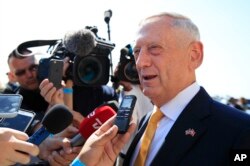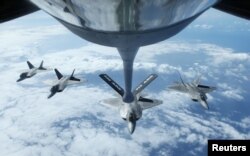The U.S. military will continue sailing ships near disputed islands in the South China Sea, Defense Secretary Jim Mattis insisted Tuesday, despite Beijing's increased complaints about the operations.
"They're freedom of navigation operations. And you'll notice there's only one country that seems to take active steps to rebuff them or state their resentment of them," Mattis said while en route to Hawaii.
The South China Sea is expected to be a major focus this week when Mattis heads to Singapore to attend the Shangri-La Dialogue, an annual gathering of Asian defense and other leaders.
Two U.S. Navy warships sailed Sunday near islands occupied by China in the Paracel Islands, off the coast of Vietnam. China sent two of its own warships to the area to warn the U.S. vessels to leave, Beijing said.
U.S. officials say the freedom of navigation operations (FONOP) are regularly scheduled and occur globally. But the latest FONOP comes at a particularly tense moment in U.S.-China relations.
The Pentagon last week rescinded its invitation to China to take part in RIMPAC, a major international maritime exercise later this year, citing Beijing's militarization of islands in the South China Sea.
Recent reports indicate China has moved air defense systems to the Spratly Islands, the latest move by Beijing to militarize South China Sea outposts.
"When they do things that are opaque to the rest of us, we can't cooperate in areas that we would otherwise cooperate in," Mattis told reporters.
Mattis also said the U.S. would continue to "confront what we believe is out of step with international law, out of step with international tribunals that have spoken on the issue."
Part of that response includes increased freedom of navigation operations, U.S. officials insist.
"It's international waters, and a lot of nations want to see freedom of navigation, so we'll continue that," Mattis said.
China claims nearly the entire South China Sea, despite overlapping claims with other countries, including Vietnam, the Philippines, Malaysia, Brunei and Taiwan.
The territorial disputes and U.S.-China relations are expected to be a major focus of the Shangri-La Dialogue. But the conference could also be dominated by talk about a possible summit in Singapore between U.S. President Donald Trump and North Korean leader Kim Jong Un.
Separate teams of U.S. officials are in Singapore and the Demilitarized Zone on the Korean Peninsula, trying to lay the groundwork for the summit, which was originally scheduled to take place June 12.
Mattis said he spoke Monday with Trump about North Korea, but he declined to comment on the status of the summit preparations.
"The diplomats are continuing to meet … at Panmunjom and there's some folks already in Singapore," Mattis said.
Before Singapore, Mattis is in Hawaii, where he will participate in a change of command ceremony at Pacific Command headquarters. He will also hold separate meetings with the defense ministers of Indonesia and Japan.






